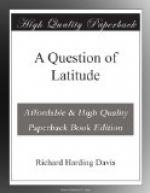So he opened Everett’s fingers.
All the blood in Everett’s body leaped to his head. That he, a white man, an Everett, who had come so far to set these people free, should be accused by one of them of petty theft!
He caught up a log of fire wood and laid open the scalp of the black boy, from the eye to the crown of his head. The boy dropped, and Everett, seeing the blood creeping through his kinky wool, turned ill with nausea. Drunkenly, through a red cloud of mist, he heard himself shouting, “The black nigger! The black nigger! He touched me! I tell you, he touched me!” Captain Nansen led Everett to his cot and gave him fizzy salts, but it was not until sundown that the trembling and nausea ceased.
Then, partly in shame, partly as a bribe, he sought out the injured boy and gave him the entire roll of cloth. It had cost Everett ten francs. To the wood-boy it meant a year’s wages. The boy hugged it in his arms, as he might a baby, and crooned over it. From under the blood-stained bandage, humbly, without resentment, he lifted his tired eyes to those of the white man. Still, dumbly, they begged the answer to the same question.
During the five months Everett spent up the river he stopped at many missions, stations, one-man wood posts. He talked to Jesuit fathers, to inspecteurs, to collectors for the State of rubber, taxes, elephant tusks, in time, even in Bangalese, to chiefs of the native villages. According to the point of view, he was told tales of oppression, of avarice, of hideous crimes, of cruelties committed in the name of trade that were abnormal, unthinkable. The note never was of hope, never of cheer, never inspiring. There was always the grievance, the spirit of unrest, of rebellion that ranged from dislike to a primitive, hot hate. Of his own land and life he heard nothing, not even when his face was again turned toward the east. Nor did he think of it. As now he saw them, the rules and principles and standards of his former existence were petty and credulous. But he assured himself he had not abandoned those standards. He had only temporarily laid them aside, as he had left behind him in London his frock-coat and silk hat. Not because he would not use them again, but because in the Congo they were ridiculous.
For weeks, with a missionary as a guide, he walked through forests into which the sun never penetrated, or, on the river, moved between banks where no white man had placed his foot; where, at night, the elephants came trooping to the water, and, seeing the lights of the boat, fled crashing through the jungle; where the great hippos, puffing and blowing, rose so close to his elbow that he could have tossed his cigarette and hit them. The vastness of the Congo, toward which he had so jauntily set forth, now weighed upon his soul. The immeasurable distances; the slumbering disregard of time; the brooding, interminable silences; the efforts to conquer the land that were so futile, so puny, and so cruel, at first appalled and, later, left him unnerved, rebellious, childishly defiant.




